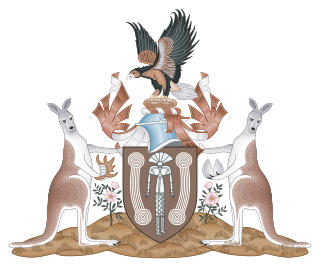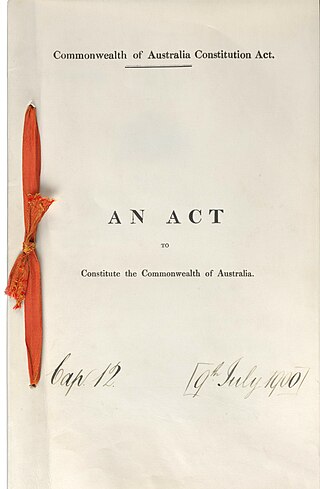
Constitutional monarchy, also known as limited monarchy, parliamentary monarchy or democratic monarchy, is a form of monarchy in which the monarch exercises their authority in accordance with a constitution and is not alone in making decisions. Constitutional monarchies differ from absolute monarchies in that they are bound to exercise powers and authorities within limits prescribed by an established legal framework.
A commonwealth is a traditional English term for a political community founded for the common good. The noun "commonwealth", meaning "public welfare, general good or advantage", dates from the 15th century. Originally a phrase, it comes from the old meaning of "wealth", which is "well-being", and is itself a loose translation of the Latin res publica. The term literally meant "common well-being". In the 17th century, the definition of "commonwealth" expanded from its original sense of "public welfare" or "commonweal" to mean "a state in which the supreme power is vested in the people; a republic or democratic state".

The Statute of Westminster 1931 is an act of the Parliament of the United Kingdom that sets the basis for the relationship between the Dominions and the Crown.

The Westminster system, or Westminster model, is a type of parliamentary government that incorporates a series of procedures for operating a legislature, first developed in England. Key aspects of the system include an executive branch made up of members of the legislature, and that is responsible to the legislature; the presence of parliamentary opposition parties; and a ceremonial head of state who is separate from the head of government. The term derives from the Palace of Westminster, which has been the seat of the Westminster Parliament in England and later the United Kingdom since the 13th century. The Westminster system is often contrasted with the presidential system that originated in the United States, or with the semi-presidential system, based on the government of France.
Judicial independence is the concept that the judiciary should be independent from the other branches of government. That is, courts should not be subject to improper influence from the other branches of government or from private or partisan interests. Judicial independence is important for the idea of separation of powers.

A Commonwealth realm is a sovereign state that has Charles III as its monarch and head of state. All the realms are equal with and independent of the others, though one person, resident in the United Kingdom, acts as monarch of each. The phrase Commonwealth realm is an informal description not used in any law.

The High Court of Australia is the apex court of the Australian legal system. It exercises original and appellate jurisdiction on matters specified in the Constitution of Australia and supplementary legislation.

The Australia Act 1986 is the short title of each of a pair of separate but related pieces of legislation: one an Act of the Commonwealth Parliament of Australia, the other an Act of the Parliament of the United Kingdom. In Australia they are referred to, respectively, as the Australia Act 1986 (Cth) and the Australia Act 1986 (UK). These nearly identical Acts were passed by the two parliaments, because of uncertainty as to whether the Commonwealth Parliament alone had the ultimate authority to do so. They were enacted using legislative powers conferred by enabling Acts passed by the parliaments of every Australian state. The Acts came into effect simultaneously, on 3 March 1986.
In many states with political systems derived from the Westminster system, a consolidated fund or consolidated revenue fund is the main bank account of the government. General taxation is taxation paid into the consolidated fund, and general spending is paid out of the consolidated fund.
A state government is the government that controls a subdivision of a country in a federal form of government, which shares political power with the federal or national government. A state government may have some level of political autonomy, or be subject to the direct control of the federal government. This relationship may be defined by a constitution.

The legal system of Australia has multiple forms. It includes a written constitution, unwritten constitutional conventions, statutes, regulations, and the judicially determined common law system. Its legal institutions and traditions are substantially derived from that of the English legal system. Australia is a common-law jurisdiction, its court system having originated in the common law system of English law. The country's common law is the same across the states and territories.
In political science, constitutional autochthony is the process of asserting constitutional nationalism from an external legal or political power. The source of autochthony is the Greek word αὐτόχθων translated as springing from the land. It usually means the assertion of not just the concept of autonomy, but also the concept that the constitution derives from their own native traditions. The autochthony, or home grown nature of constitutions, give them authenticity and effectiveness. It was important in the making and revising of the constitutions of Bangladesh, India, Pakistan, Ghana, South Africa, Sierra Leone, Zambia and many other members of the British Commonwealth.

The Government of the Northern Territory of Australia, also referred to as the Northern Territory Government, is the Australian territorial democratic administrative authority of the Northern Territory. The Government of Northern Territory was formed in 1978 with the granting of self-government to the Territory. The Northern Territory is a territory of the Commonwealth of Australia, and the Constitution of Australia and Commonwealth law regulates its relationship with the Commonwealth.

The Statute of Westminster Adoption Act 1942 is an act of the Australian Parliament that formally adopted sections 2–6 of the Statute of Westminster 1931, an Act of the Parliament of the United Kingdom enabling the total legislative independence of the various self-governing Dominions of the British Empire. With its enactment, Westminster relinquished nearly all of its authority to legislate for the Dominions, effectively making them de jure sovereign nations.

The monarchy of Australia is a key component of Australia's form of government, embodied by the Australian sovereign and head of state. The Australian monarchy is a constitutional one, modelled on the Westminster system of parliamentary government, while incorporating features unique to the constitution of Australia.

The Constitution of Australia is the supreme law of Australia. It is a written constitution that sets down the political structure of Australia as a federation under a constitutional monarchy governed with a parliamentary system and outlines the structure and powers of the Commonwealth of Australia's three constituent parts: the executive, legislature, and judiciary.
The Constitutional history of Australia is the history of Australia's foundational legal principles. Australia's legal origins as a nation state began in the colonial era, with the reception of English law and the lack of any regard to existing Indigenous legal structures. As the colonies expanded, Australia gradually began to achieve de facto independence. Over the years as a result the foundations of the Australian legal system gradually began to shift. This culminated in the Australia Act, an act formally ending legal ties with the UK.

A bill of rights, sometimes called a declaration of rights or a charter of rights, is a list of the most important rights to the citizens of a country. The purpose is to protect those rights against infringement from public officials and private citizens.
A dominion was any of several self-governing countries of the British Empire. With the evolution of the British Empire into the Commonwealth of Nations, the dominions became independent states, either as commonwealth republics or commonwealth realms.
Parliamentary sovereignty, also called parliamentary supremacy or legislative supremacy, is a concept in the constitutional law of some parliamentary democracies. It holds that the legislative body has absolute sovereignty and is supreme over all other government institutions, including executive or judicial bodies. It also holds that the legislative body may change or repeal any previous legislation and so it is not bound by written law or by precedent.